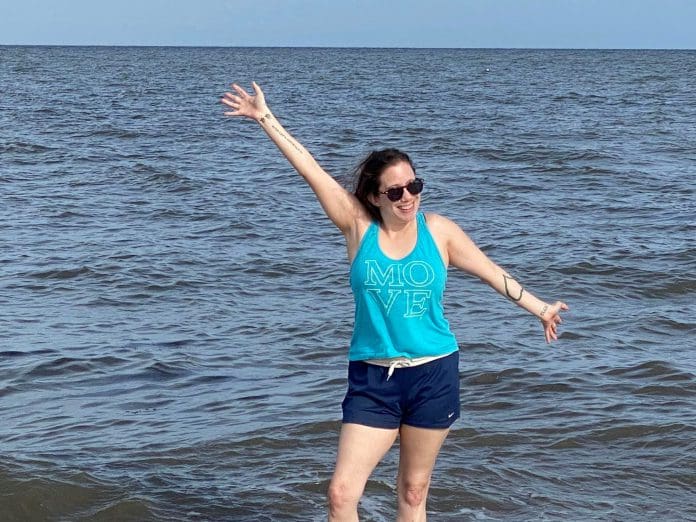Ron Sachs spent his career creating narratives, first as a journalist, then a gubernatorial spokesman, then a public relations strategist.
Now, he’s trying to create a new narrative — as a grieving father.
“To be a parent and to lose a child at any age, but particularly an adult child who you have known for 38 years, it could plunge you into a really bad place if you’re not careful,” Sachs says.
Sachs lost his middle daughter, 38-year-old Aimee Sachs, on May 31. One stroke did a little damage, then another soon after was catastrophic. In the end, the most she could do was blink her wishes — to be removed from life support and donate her organs.
This was a shock to people who knew Aimee as a petite burst of energy. She was 4’10” and weighed around 100 pounds. She was a reporter, a writer, and a sports enthusiast who was rarely still.
The family immediately created a scholarship in her memory. The Aimee Nicole Sachs Memorial Scholarship in Sports Journalism is now benefitting students at the University of Florida, Aimee’s alma mater. Thanks to donations, it has quickly grown to more than $110,000.
The future Ron Sachs envisioned for himself did not include talking about the death of any of his three daughters. But that’s what he is doing now, along with his oldest daughter Samantha, to encourage organ donation. They found comfort in knowing that Aimee’s kidneys and liver were donated.
We chatted recently about their efforts. Below are some of their comments. Click LISTEN above to hear more of the interview.
WFSU: Aimee’s obituary was so moving… Aimee was the epitome of life. She was very busy doing life, doing the things she loved.
RON SACHS: Aimee was premature, very low birth weight, like in the three-pound range. So she spent a lot of time in the infant intensive care unit. So her mom and I would go there for meals and see her as much as we could, but she learned as an infant to be stronger and independent because she didn’t have people holding her all the time. And I think that as much as we hated that, it really helped her in her life as a tiny person.
She was always small and took growth hormone. But I think she was fierce and strong, sometimes defiant. But she was very brave and was unafraid of doing things like being on television, being a journalist, which is what I was. So she was fearless about many things, and yet sometimes felt very insecure about what’s next.


WFSU: Aimee was a fighter… She was born too early. She went on to excel in sports despite her size. She excelled in her career.
RON SACHS: She was a terrific reporter and a terrific writer and had this passion for sports since she was a little girl, particularly baseball, especially Major League Baseball. And that she turned out being a contractor writing for Major League Baseball was like a dream come true — to be in the press box with mostly guys covering the Atlanta Braves or any game was a dream for her.
WFSU: You talk about how, in the end, she was still a fighter, and she was still taking charge of her life right down to the very end when she was incapacitated.
RON SACHS: She had two strokes in less than two weeks. And we thought after the first one in late May that she was recovering… Then she had a massive one on May 28.
This stroke was so major that it created a situation called locked-in syndrome where nothing in her body would ever work again. She’d never walk, she’d never talk, she couldn’t feed herself. The only function that could move were her eyes. She could blink her eyes. She could think, she could feel emotion. So she’s on a ventilator, and we had them wake her up on May 30th, the day before she died. And I have to break the news to her that she’s in this situation.
I said to her, you could live like that if you want. You’ll have a lot of help and machines and institutions. But if you don’t want to live like that, let me know by shutting your eyes. And she quickly shut her eyes to the point that her eyelids wrinkled.
Then on her driver’s license, she had checked the box for being an organ donor… But we wanted to affirm that. And I asked her, do you believe in organ donation? Do you want to donate some of your organs? So we’re sitting there at her bedside, and she’s making the decision to leave rather than stay in this condition, and to give life to others.


WFSU: It’s unfathomable.
RON SACHS: Losing a child is a depth of sadness I never wanted to feel, but we’re trying to honor her memory by keeping her close every day and by getting very involved in this organ donor program.
SAMANTHA SACHS: She took control of her life in the only way she could, and it was the bravest thing I’ve ever witnessed in my life.
WFSU: She impacted a lot of people around the state. People who didn’t know her as well were impacted by her life and how it ended and how you all have chosen to go on.
RON SACHS: A week before she died, Aimee’s recovering from the first stroke, which was a small stroke if there’s such a thing, and Samantha was there every day dawn till dusk. Aimee loved music, loved to sing, they all did. And Samantha (recorded a video). The 47-second clip that we showed at the memorial is going to be eternalized, but I’ll let you tell that story, Sam.
SAMANTHA SACHS: On Wednesday, May 24, the neurologist came in and told us that Aimee had a small stroke the day she entered the hospital. And finding that news out put Aimee in a really dark place emotionally. She was very depressed that day.
Then, maybe around 5 o’clock that evening, I convinced her to let me turn on her Pandora app on her phone. And she was lip syncing different songs, and then Michael Jackson’s “Man In the Mirror” came on. And she started lip syncing to that and I said, can I take a video? She said, yeah, take a video.
Her performance just lip syncing to the song is so funny. She gets to this one part, and she scrunches her eyes closed and puts her hands in fists and silently belts out this one line from Michael Jackson.
RON SACHS: The song for those who don’t know it (goes) “if you want to make the world a better place, take a look at yourself and make a change.”
Samantha recorded that 47 seconds, (it) really is a treasure. And the postscript to that is that friends of ours who are videographers are getting permission to use the music and create a 60-second PSA (public service announcement) with Aimee starring in it, crushing the lip sync of “Man In the Mirror” and using that as a boost for organ donation.
SAMANTHA SACHS: No one expects that they will find themselves in a position where they could be an organ donor. But when you sign up at the DMV, it’s such a crucial choice that you can make.
If you’re a Florida resident and you’re inspired by Aimee’s story and have not registered to be an organ donor through the DMV, you can go to Donate Life Florida and sign up there.
RON SACHS: There also is a license tag the organ donation folks are trying to promote. There are all these specialty license tags in Florida… We hope people would go and say they’d want to buy one of these license tags because it’s got to reach a threshold of 3,000 commitments for the tag to come to life.
The irony is, it will help promote life if you have this tag on your car, and this PSA is also going to help boost the tag sales, we hope.




9(MDA4MzU1MzUzMDEzMTkyMzAwMzY5MjY1Mw004))
9(MDA4MzU1MzUzMDEzMTkyMzAwMzY5MjY1Mw004))


